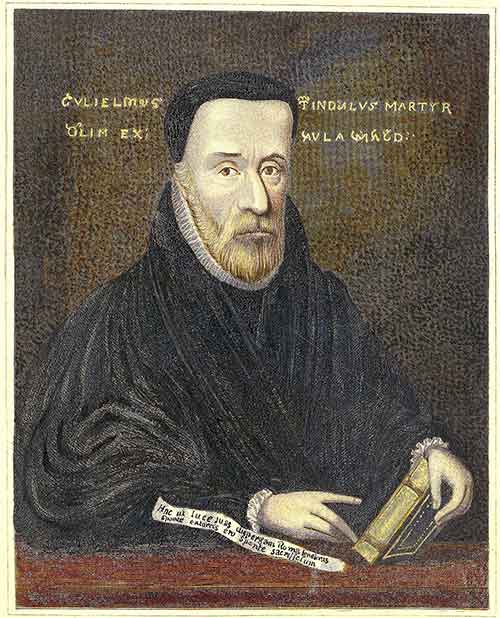
William Tyndale (c. 1494 – 1536) was an English priest. He was the first person to produce an English translation of the Bible directly from the Hebrew and Greek texts. Erasmus had made the Greek New Testament available in Europe. Tyndale was also the first English translator of the Bible to be able to use the printing press – a huge advantage. A strong linguist, there was no one good enough to teach him Hebrew – so he went to contintental Europe to learn that.
In Foxe’s Book of Martyrs (Chapter XII) Tyndale meets a scholar who says, “We were better to be without God’s laws than the pope’s.” Foxe records Tyndale’s reply: “”I defy the pope, and all his laws;” and added, “If God spared him life, ere many years he would cause a boy that driveth the plough to know more of the Scripture than he did.””
Henry VIII’s men pursued him to continental Europe. In 1535, Tyndale was arrested for heresy. He was imprisoned near Brussels for over a year. He was tried, strangled, and burnt at the stake. His last words were, “Lord, open the king of England’s eyes.”
It is estimated that in the King James New Testament 84% comes from Tyndale’s Bible, and in the Old Testament 76% does.
These are some of the phrases we regularly use that go back to Tyndale:
* lead us not into temptation but deliver us from evil
* knock and it shall be opened unto you
* twinkling of an eye
* a moment in time
* fashion not yourselves to the world
* seek and you shall find
* ask and it shall be given you
* judge not that you not be judged
* the word of God which liveth and lasteth forever
* let there be light
* the powers that be
* my brother’s keeper
* the salt of the earth
* a law unto themselves
* filthy lucre
* it came to pass
* gave up the ghost
* the signs of the times
* the spirit is willing
* live and move and have our being
* fight the good fight
Tyndale also created some new words: Jehovah, Passover, scapegoat.
Tyndale used “overseer” where the church previously would have understood “bishop,” “elder” for “priest”, “congregation” rather than “Church”, and “love” rather than “charity”. These choices are taken up in the history of the King James Bible.
- You can read the Tyndale Bible here
- You can read the Tyndale New Testament here – reworked with contemporary spelling
- You can download the Tyndale Bible here
- You can download the Tyndale Bible here (zip file)
Foxe gives 6 October as the date of commemoration (his left-hand date column), but gives no date of death (his right-hand date column). Churches celebrate William Tyndale on 6 October. A New Zealand Prayer Book He Karakia Mihinare o Aotearoa celebrates “The Saints and Martyrs of Asia” on 6 October – why? I do not know. That Prayer Book also originally (mostly!) followed a doctrine of only one celebration per day, and so moved Tyndale’s celebration to 7 October. I do not know, even within the only-one-celebration-a-day doctrine, why Tyndale was not left on 6 October. Why could The Saints and Martyrs of Asia not be celebrated on 7 October? What is so special about 6 October in relation to The Saints and Martyrs of Asia that Tyndale was moved from his international celebration to make way for The Saints and Martyrs of Asia?


